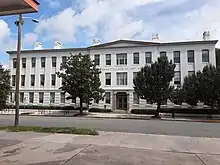Dorothea Abrahams
Dorothea Abrahams (1779 – February 6, 1853) was a West Indian philanthropist who left funds in her will to open the Abrahams Home for Indigent Widows of Savannah in Savannah, Georgia, United States.
Dorothea Abrahams | |
|---|---|
| Born | 1779 Anastasia, West Indies |
| Died | February 6, 1853 (aged 72 or 73) Savannah, Georgia, U.S. |
| Resting place | Laurel Grove Cemetery, Savannah, Georgia, U.S. |
Life and career

Abrahams was born on Anastasia, West Indies, in 1779.[1] A visitor to the island from Philadelphia brought Dorothea home with her. At school in Philadelphia, one of her classmates was future First Lady of the United States Dolley Madison.[2]
She became friends with a girl, last name Pooler, who was from Savannah, Georgia. Abrahams accepted Pooler's invitation to come visit her for a while, and it was there that she met and married Captain Abraham De Lyon Abrahams in 1803. They lived on Broughton Street.[2] A Jew, the captain was a member of the Congregation Mickve Israel in Savannah's Monterey Square.[2]
In 1808, the couple moved to Washington, D.C. James Madison had just become president, and Dorothea's childhood friendship with Madison's wife seemingly earned Abraham employment under the president.[1]
The Abrahamses returned to Savannah in 1826. Four years later, their household consisted of eleven people: Abraham, Dorothea, six male slaves and three female slaves.[2]
Captain Abrahams died in 1844, aged 71, of apoplexy.[2]
Five years later, Dorothea was living at 179 Broughton Street in Savannah.[2] In 1852, she bought a 12-year-old "mulatto girl" from a George Wylly.[2]
Death and legacy

Abrahams died on February 6, 1853, aged 72 or 73, from dropsy.[2] She was interred in Savannah's Laurel Grove Cemetery. Her husband, whom she survived by nine years, was buried in Mordecai Sheftall Cemetery.[3]
In her will, she left funds to establish the Abrahams Home for Indigent Widows of Savannah.[1] Lots 31 and 34 on Broughton Street, at its intersection with East Broad Street, were set aside to build the three-storey home. Its cornerstone was laid on July 3, 1856. John S. Norris was its architect.[2][4]
In the 1980s, the home was occupied by women of advanced age who were in good health and could care for themselves. They paid rent on a sliding scale according to their income.[2]
In 2022, the fund started by Abrahams had become a $2 million endowment.[3]
References
- Powers, Julia (1984-02-28). "Research Project on Dorothea Abrahams". Savannah Biographies.
- Research Project on Dorothea Abrahams, Julia A. Powers, Armstrong State University (1984)
- Fishman, Jane. "'Women helping women': After 200 years, the Savannah Widows' Society emerges from the shadows". Savannah Morning News. Retrieved 2022-06-01.
- "History". Savannah Widows' Society. Retrieved 2022-06-01.